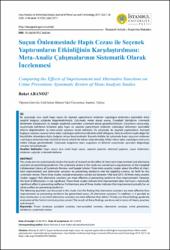Suçun Önlenmesinde Hapis Cezası ile Seçenek Yaptırımların Etkinliğinin Karşılaştırılması: Meta-Analiz Çalışmalarının Sistematik Olarak İncelenmesi
Citation
ABANOZ, Buket. "Suçun Önlenmesinde Hapis Cezası ile Seçenek Yaptırımların Etkinliğinin Karşılaştırılması: Meta-Analiz Çalışmalarının Sistematik Olarak İncelenmesi." Ceza Hukuku ve Kriminoloji Dergisi, 5.2 (2017): 1-28.Abstract
Bu çalışmada, kısa süreli hapis cezası ile seçenek yaptırımların mükerrer suçluluğun önlenmesi üzerindeki etkisi
ampirik bulgular eşliğinde değerlendirilmiştir. Çalışmada metot olarak arama, Campbell İşbirliği’nin sistematik
derlemeler kütüphanesi ve Google akademik üzerinden sistematik olarak gerçekleştirilmiştir. Çalışmanın sonucunda,
araştırmada belirlenen kriterlere göre hapis ve seçenek yaptırımların mükerrer suçluluğun önlenmesi üzerindeki
etkisini değerlendiren üç meta-analiz çalışması tespit edilmiştir. Üç çalışmada da seçenek yaptırımların, hürriyeti
bağlayıcı cezalara nazaran tekrar eden suçluluğun önlenmesinde daha etkili olduğuna, fakat bu etkinin kayda değer bir
büyüklükte olmadığına ilişkin bulgular ortaya koyulmaktadır. Bununla birlikte, bir çalışmada hapis cezasının mükerrer
suçluluğun önlenmesinde istatistiksel olarak anlamlı bir etkiye sahip olmadığı, bilakis tekrar eden suçluluğun artmasına
neden olduğu görülmektedir. Çalışmada bulguların teori, uygulama ve bilimsel araştırmalar açısından doğurduğu
sonuçlar tartışılmaktadır. This study aims to systematically review the results of research on the effect of short-term imprisonment and alternative
sanctions on preventing recidivism. The systematic review in this study was carried out using resources at the Campbell
Collaboration Library of Systematic Reviews and Google Scholar. Three meta-analytic studies about the effect of shortterm
imprisonment and alternative sanctions on preventing recidivism met the eligibility criterias set forth for this
systematic review. These three studies include evaluations carried out between 1960 and 2013. All three meta-analytic
studies suggest that alternative sanctions are more effective at preventing recidivism than imprisonment. However,
the level of effectiviness is not significant. These three studies indicate that imprisonment does not have a statistically
significant effect in preventing reoffense. Furthermore, one of three studies indicates that imprisonment actually has an
adverse effect on preventing recidivism.
The following questions are discussed in this study: Can the finding that alternative sanctions are more effective than
imprisonment on preventing recidivism be generalized across all alternative sanctions? In addition, is it possible to
draw conclusions as to which alternative sanctions are more effective than others? Finally, can these findings guide the
evaluation of the Turkish criminal justice system? The results of these findings are discussed in terms of theory, practice,
and research.



















